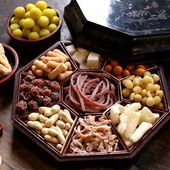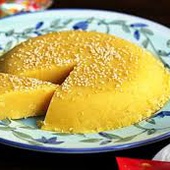Vietnam's Most Common Seeds & Nuts For New Year
During Tet, every family in Vietnam prepares a special tray of snack to offer guests, containing a variety candies, biscuits, jam, fruits; and roasted nuts are essential components of the tray. Vietnamese people eat roasted nuts with the main purpose to create a cheerful and friendly environment in which the hosts and the guests enjoy nuts together.
Unlike the already de-shelled seeds found in bulk store, cooked seeds are kept intact in Vietnam and sometimes trying to separate the edible part from the hull can be both an art and a time-consuming activity. Who would want to rush in Tet anyway? A cup of tea would be even more perfect and the discussion can last forever, just plainly with tea and nuts. In addition, each type of nut has its own nutrition considered to be good for health and the diverse flavor that can only feel by tasting them all. Below are top 5 most common roasted nuts and seeds in Vietnam during Tet.
Hạt dưa (Watermelon seeds)
If you have enjoyed watermelon, you should have seen numbers of black seeds inside the fruit. Those are actually hạt dưa we are discussing about. However, only the biggest nuts will be chosen to be dried under the heat and then be roasted in big pans to have the final product. There are 2 type of hạt dưa: red and black depending on the natural pigment used to color them.
%20-%20Photo%20%40phunutoday.vn.png) Photo @phunutoday.vn
Photo @phunutoday.vn
Hạt dưa is a clean and healthy nut with a lot of nutrition such as protein, glucid, lipid; vitamins B1, B2, E; calcium, iron, zinc, etc. Especially, protid inside hạt dưa is an essential component for nervous system and the growing of muscles, blood and bones. Eating a handful of hạt dưa everyday may enhance memory and protect from coronary heart diseases.
Hạt bí (Pumpkin seeds)
Selecting from the biggest seeds of ripe pumpkin, hạt bí is among the most favorable nuts during Tet since it is easier to open than hạt dưa. The process of cooking hạt bí is exactly the same with hạt dưa, however, there is not any pigment to color the nuts.
%20-%20Photo%20%40plo.vn.jpg) Photo @plo.vn
Photo @plo.vn
Both traditional and modern medicine proved that hạt bí containing many substances which benefits human health such as protid, lipid, glucid, calcium, magnesium, fiber and L-tryptophan. This nut is now being remedy for diseases like kidney disease, intestinal disease and coronary heart disease.
Hạt hướng dương (Sunflower seeds)
%20-%20Photo%20%40ifarmer.vn.jpg) Photo @ifarmer.vn
Photo @ifarmer.vn
The name of this nut indicated its origin quite clearly that is collected after sunflowers fully grown. After being dried and roasted under adequate heart and sometime added with additional flavor like salt and licorice, delicious hướng dương is ready to be enjoyed. This nut is the favorite snack of children and youngsters in Vietnam that it is eaten in the whole year, especially with ice-tea or lemon tea, not only during Tet. Besides possessing similar amount of nutrition like other nuts mentioned above, hạt hướng dương can also be used to slow the aging process of human, accelerate cell generation process and enhance memory.
Hạt điều (Cashew nuts)
Hạt điều has its origin from Northern China and Mongolia is among the most luxury type of roasted nuts because its trees can only produce fruits one time per 4-5 years. Hạt điều is usually roasted with salt for better preservation as well as improve its taste. In Vietnam, the food is regarded as a symbol of luck.
%20-%20Photo%20%40oky.vn.jpg) Photo @oky.vn
Photo @oky.vn
Hạt điều contains many healthy substances like vitamin B1, B2, B3, calcium, protein, phosphorous and cholesterol-free. Monounsaturated in Hạt Điều may reduce the risk of having cancer; and an ideal choice for people who are on diet due to a huge amount of fiber.
Hạt dẻ cười (Pistachio)
Pistachio is originated from Persia (Iran) is the most luxury and expensive type of roasted nuts available in Vietnam. Due to similar shape and the way to eat with chestnut, pistachio is called hạt dẻ cười (Chesnut is “hạt dẻ” in Vietnamese). The nuts is especially match with a cup of tea or snack for beers and wine since alcohol is the most common drink in Vietnam during Tet.
%20-%20Photo%20%40kolala.vn.jpg) Photo @kolala.vn
Photo @kolala.vn
With its rich amount of nutrition, pistachio may reduce the oxidation process and stress; good for digestive system as it contains the highest level of fiber in all types of nuts. Heart diseases is also believed to be demolished by eating pistachio frequently.

Essenstial Vietnamese New Year's Food
Vietnamese people have a very good habit of saving, which are reflected by the regular meals – rice with a main dishes (meat or fish/shrimp), a vegetable food and a bowl of soup.

Mung Bean Pudding - Vietnamese Che Kho
To many Hanoian generations, mung bean pudding has become a familiar dish which always presents on the ancestors’ altar at New Year’s Eve.

Bánh Tét - Essential to Tet in the South of Vietnam
Banh Tet, a representative cake in the South Vietnam, can be easily found at any house during Tet.











